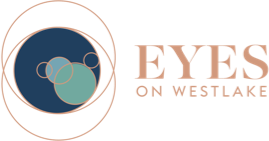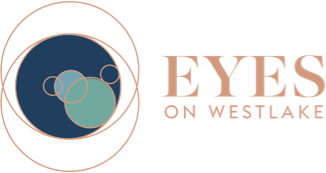Needing the support of glasses or contacts to enjoy clear, sharp vision is common. In fact, most people have some kind of refractive error causing blurry vision. Among refractive errors, myopia, or nearsightedness, is the most common.
Myopia develops because of irreversible physical changes in the eye’s structure. We can, however, use myopia control therapies to slow myopia progression to prevent vision from worsening.
A myopia control consultation will determine which therapy option is most suitable for you or your child.
Is Myopia Reversible?
Myopia develops because of structural changes in the eye’s shape.
An eye with no refractive error is perfectly round and curved, which allows incoming light to focus directly on the retina, resulting in clear vision at all distances.
On the other hand, an eye with myopia either grows too long or its cornea becomes too curved, causing incoming light to focus in front of the retina instead of directly on it. This misalignment causes blurry distance vision.
Since myopia stems from physical changes to the eye’s shape, it cannot be reversed. Unlike temporary concerns with visual clarity, like those caused by dry eyes or incorrect glasses prescriptions, structural changes cannot simply “reverse” back into their original state.
However, this doesn’t mean there’s no hope for managing myopia. Myopia control therapies are designed to slow the condition’s progression, reduce reliance on corrective lenses, and mitigate the risks associated with severe or high myopia.
All About Myopia Control
Myopia control is a series of interventions aiming to slow its progression. These treatments won’t reverse myopia. Instead, they focus on preventing the condition from worsening over time.
These therapies work by altering how light enters the eye, helping to reduce the stimulus for eye elongation.
Importance of Myopia Control
The focus on slowing myopia progression isn’t just about maintaining sharp vision—it’s necessary for preserving eye health.
As myopia continues to advance, and the eye’s shape continues to change, the chance of developing high myopia increases.
High myopia refers to a vision prescription of -6.00 diopters or over. When high myopia is present, a person’s risk of developing serious eye conditions increases. Some of these conditions include:
- Retinal detachment: Excessive eye elongation can strain the retina, leading to tears or detachment.
- Glaucoma: Higher levels of myopia are linked to an increased likelihood of optic nerve damage from glaucoma.
- Myopic macular degeneration: Stretching of the retina in eyes with high myopia can cause vision-threatening changes to the macula.
- Cataracts: People with high myopia are more likely to develop cataracts earlier in life.
Myopia control therapies aim to prevent high myopia from developing, but early intervention is key to reducing these risks. The earlier we introduce these strategies, the better your response to treatment.

Who Benefits from Myopia Control?
Many people with progressing myopia can benefit from these therapies. However, the sooner you start, the better.
Children and adolescents benefit the most because their eyes are still growing and changing. Slowing the eye’s elongation during these formative years can significantly reduce myopia severity in adulthood.
Adults with mild or moderate myopia may not gain as much of a benefit from control therapies, as their eye growth has typically stabilized, so there aren’t any changes to the eye to slow down or control. However, there’s no harm in discussing your options with your optometrist.
Myopia Control Therapies with Eyes on Westlake
Finding the right approach to myopia control may seem overwhelming, but our vision team is here to help.
At Eyes on Westlake, we’re proud to offer a range of innovative treatments to help our patients manage and slow myopia progression.
Orthokeratology Lenses (Ortho-K)
Ortho-k lenses are specially designed, gas-permeable contact lenses that gently reshape the cornea overnight while you sleep. When you wake up, you can enjoy clear vision during the day, without needing glasses or contacts.
This temporary corneal reshaping helps reduce myopia progression by altering how light enters and focuses within the eye. Besides this, ortho-k lenses help you enjoy clear vision during the day while supporting your eye health.
Studies show that ortho-k effectively slows myopia progression in young adults up to age 29.
Multifocal Lenses
Multifocal contact lenses correct myopia while providing additional lens power for close-up tasks. These lenses have different focal points, which affect peripheral defocus on the retina in a way that causes the eye to grow less elongated.
This simultaneous correction allows you to see clearly at all distances while slowing the progression of myopia.
Multifocal lenses are particularly beneficial for kids and teens who also engage in frequent near-work activities, such as studying or using screens.
MiSight® Daily Contacts
MiSight® 1-day disposable contact lenses are a popular choice for myopia control in children. Studies show they can help slow myopia progression in children as young as eight!
These lenses feature two treatment zones that create peripheral defocus, effectively redistributing light onto the retina in a way that prevents eye elongation.
Low-Dose Atropine Drops
Atropine eye drops at lower concentrations (typically 0.01% to 0.1%) are a great option for slowing myopia progression. These drops reduce near-focusing stress and alter visual signals driving eye elongation.
Low-dose atropine drops are often combined with other treatments, such as ortho-k or multifocal lenses, for a more comprehensive approach to myopia control.
Take Control of Myopia
Although myopia isn’t reversible, you don’t have to accept its progression as inevitable. With effective myopia control therapies, it’s possible to safeguard your vision and eye health.
At Eyes on Westlake, we’re dedicated to helping you and your loved ones enjoy clear and healthy vision for years to come. Connect with our team for a myopia control consultation.





